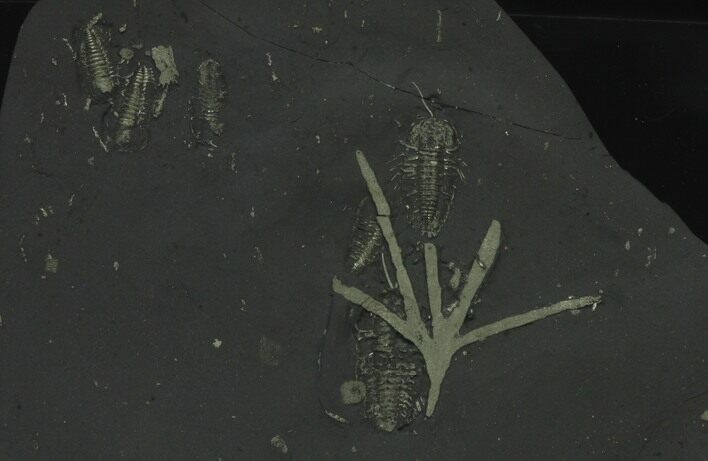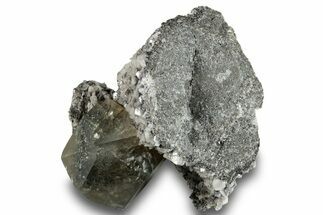This Specimen has been sold.
Seven Pyritized Triarthrus Trilobites With Appendages - New York
This is an exceptional piece with seven pyritized Triarthrus trilobites with preserved appendages, antennae and EGGS! Until recently little had been known about the reproduction of these iconic paleozoic arthropods, and never before have unambiguous eggs or genitalia been found preserved. Trilobites from a single layer of the a quarry in the Whetstone Gulf Formation of New York, were found to have associated eggs still in place. The eggs are spherical to elliptical in shape, about 200 µm in size, and are clustered in the genal area of the cephalon The location of the eggs is consistent with where modern female horseshoe crabs release their unfertilized eggs.
The largest specimen is .71" long (including antenna). Four of the trilobites are preserved dorsally, while the remaining trilobites are preserved ventrally. These trilobites are naturally associated with what appears to be a pyritized bryozoan. The trilobite that has eggs is .38" long (including antennae) and is the only trilobite that's not clustered with any other trilobites.
Below is a link to a published paper on this amazing find.
Pyritized in situ trilobite eggs from the Ordovician of New York (Lorraine Group): Implications for trilobite reproductive biology
A great article on this discovery can be found below.
Wow! Fossilized trilobite eggs!
The localities that preserve trilobites with soft bodied preservation can probably be counted on one hand. One of these localities is the historic Beecher's beds in the Lorraine Group of NY. Less than a decade ago a new locality was discovered a short distance away that has produced amazing, soft bodied preservation of trilobites and other organisms. Because of the rapid burial of the trilobites, in an anoxic environment the soft body parts were replaced by pyrite preserving details not typically seen.
Preparation of these soft bodied specimens is an immensely time consuming task. It is done under high magnification using extremely low pressure air abrasion. A specimen like this would have taken many hours to complete.
The largest specimen is .71" long (including antenna). Four of the trilobites are preserved dorsally, while the remaining trilobites are preserved ventrally. These trilobites are naturally associated with what appears to be a pyritized bryozoan. The trilobite that has eggs is .38" long (including antennae) and is the only trilobite that's not clustered with any other trilobites.
Below is a link to a published paper on this amazing find.
Pyritized in situ trilobite eggs from the Ordovician of New York (Lorraine Group): Implications for trilobite reproductive biology
A great article on this discovery can be found below.
Wow! Fossilized trilobite eggs!
The localities that preserve trilobites with soft bodied preservation can probably be counted on one hand. One of these localities is the historic Beecher's beds in the Lorraine Group of NY. Less than a decade ago a new locality was discovered a short distance away that has produced amazing, soft bodied preservation of trilobites and other organisms. Because of the rapid burial of the trilobites, in an anoxic environment the soft body parts were replaced by pyrite preserving details not typically seen.
Preparation of these soft bodied specimens is an immensely time consuming task. It is done under high magnification using extremely low pressure air abrasion. A specimen like this would have taken many hours to complete.
SPECIES
Triarthrus eatoni
AGE
LOCATION
Lewis County, NY
FORMATION
Whetstone Gulf Formation, Lorraine Group
SIZE
Largest specimen .71" long on 4.3 x 3.6" rock
CATEGORY
SUB CATEGORY
ITEM
#129113
We guarantee the authenticity of all of our specimens.
 Reviews
Reviews
















